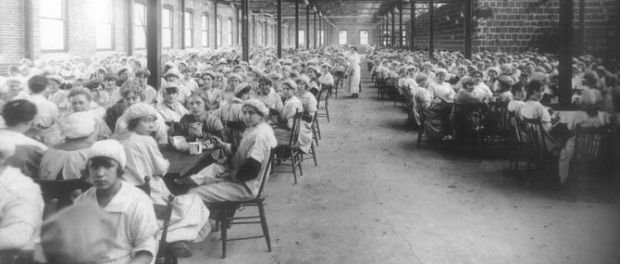100 Years and Still at War: Fenarrio A Good Fight Reviewed
Verdun, Quebec born renowned Canadian playwright David Fenarrio came upon a photograph of a woman at a munitions factory in Verdun and that became the stage of his latest play: Motherhouse. In the documentary “Fenarrio: A Good Fight,” which is screening at this year’s RIDM documentary film festival in Montreal, Fenarrio says he looked into the eyes of this one woman in the photograph, sitting among hundred others on a factory floor and he saw that she had a story to tell, as if she knew something had happened. This was the beginning of his play that critiques war and its futility, relevant today just as much as it was a hundred years ago.
The documentary follows the writing and production of the play by Fenarrio, which fictionalizes the woman in the photograph. While the film starts with the discovery of the photo by Fenarrio, it brings back memories of his grandmother, one of the women who worked in the munitions factories during World War I, the lost lives of Verdun soldiers who perhaps knew nothing about the war they were fighting. Through the process of developing and staging the play, the film follows Fenarrio’s journey over eighteen months to opening night of the play, as walks through old warehouses, factories sites around Verdun, that take him back to the years of the War. He points to rue de la Poudrière, which is named after a gunpowder factory, whose remnants still speak to what went on there over a century ago. Fenarrio is scathing in his attack on the real profiteers of war and how the common man, the ordinary worker has no say in who they fight and why. He stares vacantly at the empty buildings that tell stories of the lives lost.
Most of the film is shot in Verdun and a few other parts of Montreal. The film though local in scale resonates with a larger theme of the meaning of war and the real beneficiaries of it. Verdun sent out the most number of soldiers to war than any one single neighbourhood. With interesting archival footage of women working in these war factories, young men (including Fenarrio’s grandfather) being shipped to a war they perhaps knew little about, the film is paced lethargically, without any dramatic moments of war and its effects. But it’s personally engaging as a story of how us common people are only tools to the whims of the power brokers.
Told through the narrative eye of Fenarrio, who trudges along different streets of his neighbourhood in his motorized wheelchair, you see a man passionate about his art form and recognizing that life is only worth living if lived for and other people. A simple narrative style and an interesting story of a grassroots artist, the film is about Fenarrio, the artist, the playwright, his ideology and his work that has thrived through the stories of his Montreal neighborhood Verdun and beyond.
The film plays as part of the RIDM on November 19 at UQAM (200 Sherbrooke E) at 5:45 p.m. and is at Cinema du Parc starting November 24. The RIDM runs until November 23. Read the Montreal Rampage review of the original play HERE.






